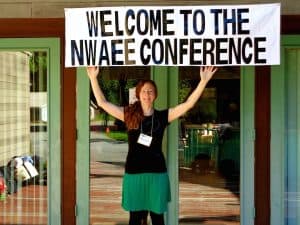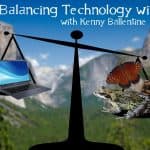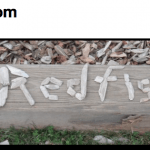Wayfinding – What’s your Journey?

To share her experience, we asked her a few questions:
1) Can you describe to other CBEEN members what you leared? Were there any knowledge or skills that might help them in improving their environmental education programs?
I learned how to facilitate many specific nature-based activities and games that are designed to improve students’ social-emotional skills. A key part of having students do these activities and games is to debrief the activities afterwards, and also to frame them in a way that encourages the most learning. For example: explicitly talk about ways to show caring or respect or honesty or responsibility, then have students play a game, and debrief it afterwards: “How did we show caring (or respect or honesty) during this activity?” A simple process to keep in
mind when facilitating the debriefing of activities is: 1. What? 2. So What? 3. Now What? This helps students transfer their learning to other areas of their lives, and make it relevant.
Some specific activities we learned include:
? Zones of Regulation (set up three zones with coloured string or webbing – the
Comfort Zone, the Learning/Growth Zone, and the Overstimulated/Panic Zone). Give
some example scenarios of specific situations, and students move to whatever zone
that situation would put them in – discuss what this means (including perception of
risk).
? Triangle Tag – this can be framed as a way to look at goal-setting. For example, the
positive influences in our lives are the people helping to protect us from who is “It”
in the game. The person or people who are “It” can be discussed as negative
influences on us reaching our goals.
? Tarp Game: the whole group of kids stand on one tarp, and they have to figure out
how to move it down the field 10 m or so – no-one can step off of the tarp.
One key take-away form this conference was that anytime teachers can get kids outside
and into nature, it helps the students self-regulate. Another key learning was that
experiential activities can be used to help learn many different concepts – it all depends
on how they are framed and then debriefed afterwards.
2) Did you come across any great resources or tools that you think other CBEEN members would benefit from?
1) Laurie Frank’s book: Journey Toward the Caring Classroom – Using Adventure
to Create Community
2) AEE (Association of Experiential Education) Northwest Region website –
http://www.aee.org/northwest. This has info on the annual conferences, resources
including the Journal of Experiential Education, etc.




